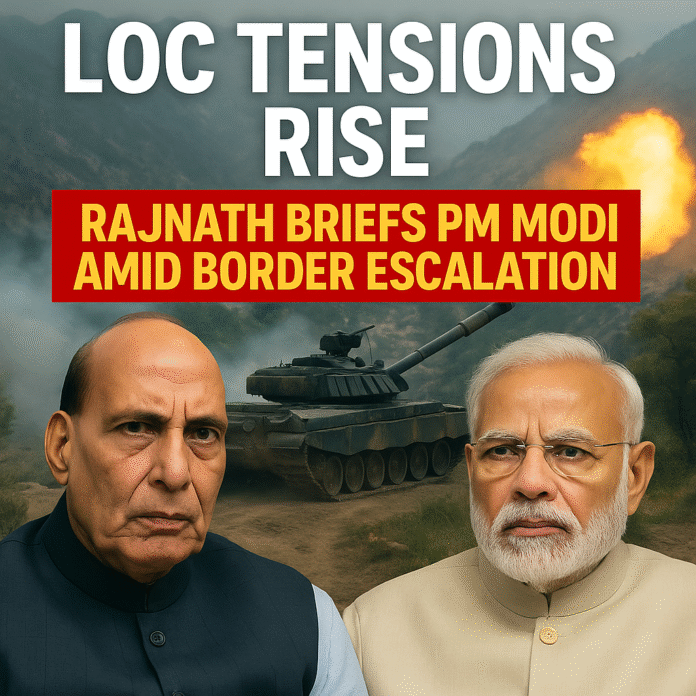Pakistan—was passed after a discussion in which CM Abdullah said he would not cite the attack as a push for statehood. Defense Minister Rajnath Singh met Prime Minister Narendra Modi in Delhi on Monday and briefed him on the security dynamics in Jammu and Kashmir and the army’s preparedness after the Pahalgam terror attack, a 40-minute meeting that came hours after the Indian Army opened fire and violated the ceasefire for the fourth consecutive day. It came a day after Modi reiterated his resolve to give “severest punishment” to terrorists—suggesting India is considering military options to target the neighboring country for supporting terror. It has already suspended the 1960 Indus Waters Treaty, downgraded bilateral ties, and closed the only operational land border crossing at Attari after the April 22 attack that killed 26 people. Earlier in the day, the Jammu and Kashmir Assembly unanimously passed a resolution expressing shock and outrage over the attack and decided to “deplore the damage done to the communal harmony.” The resolution—which did not mention Pakistan—was passed after a discussion in which Chief Minister Omar Abdullah said he would not mention the attack for granting statehood to the Union Territory. “As the Chief Minister of Jammu and Kashmir and the Tourism Minister, I had invited these people here. It was my duty to ensure that they were safely sent back to their homes. I could not send them back,” a CM said, adding that he did not add a visible word. The victims. Last Tuesday, a group of heavily armed terrorists emerged from the jungle and targeted tourists in the Baisaran grassland near Pahalgam in Kashmir. Twenty-six people were killed — all men, 25 of them tourists and 24 of them Hindus — in the attack that harkened back to the heyday of militancy in the 1990s and 2000s and was the worst to rock the country since the 2008 Mumbai terror attacks. The front claimed responsibility for the attack, which coincided with a visit to India by US Vice President JD Vance. New Delhi has since identified three Pakistani terrorists and used signals intelligence to underline Islamabad’s role in the attacks. The latest round, overnight, came in the form of unprovoked firing in the Poonch and Kupwara sectors, breaking a February 2021 ceasefire agreement and signaling the intention of the neighboring army to escalate the frontline offensive after killing 26 people, officials familiar with the matter said. Previous ceasefire violations took place in sectors including Uri, Tangdhar, Kupwara, and Gurez in the north of the Pir Panjal range, but the latest violation in the Poonch sector in the south indicates the Pakistan Army’s intention to activate the entire border. On Sunday night, troops were deployed along the Indian Army’s front. Provocative and targeting enemy posts facing the Tutmari Gali and Rampur sectors in north Kashmir.With the ceasefire being breached, the violations are likely to intensify and spread along the LoC, HT reported on Monday, citing a top official.Separately, in Jammu, Abdullah called for a spontaneous shutdown in protest against the widespread protests and killings in the region, stating that there was no support for terrorists. The security of Jammu and Kashmir is not the responsibility of the elected government, but I will not cite the Pahalgam attack in the demand for statehood. Now how can I push for statehood? I don’t want such cheap politics at this stage,” he added. On Sunday, Modi reiterated his resolve to “severely” punish those behind the Pahalgam attack, which was aimed at derailing the development of Kashmir, as he urged the people of the country to remain united in the fight against terrorism. Hostilities along the LoC are at their worst in four years since the Pahalgam attack, which was mostly a ceasefire until the 2021 ceasefire. Unlike the isolated, brief exchanges that were quickly resolved through established channels, the current pattern involves simultaneous salvos at multiple points along much of the 740-km border and has continued with increasing frequency even after the Pahalgam terror attack. Pakistan has also issued tit-for-tat responses to punitive measures, but India has announced that it is suspending the ceasefire. The two armies had announced on February 25, 2021, that they had started observing a ceasefire along the LoC from midnight on February 24. They had earlier held a ceasefire in November 2003. A ceasefire was agreed upon, but it was frequently violated. Ceasefire violations by neighboring armies have traditionally been aimed at providing cover for infiltrators.Last week, Singh expressed India’s determination to soon punish not only those who carried out the horrific attacks but also their handlers. On April 23,




